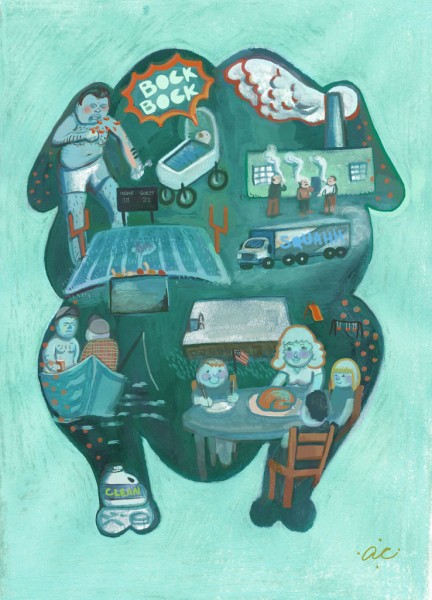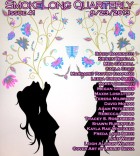The chicken plant was our town, and our town was the chicken plant. Still had a steam whistle that blew once at the beginning of shift and twice at its end. Dad told us it was how people got out of bed before alarm clocks. He stepped into khakis at 5:30, shaved bare-chested at 5:35, buttoned up at 5:45, and was out the door at 6:15, touching the tops of our heads as we nodded over our cereal in the dark.
He was a manager who doted on younger guys and liked a motherly secretary. He fished, drank, and hunted with chicken men. Lincoln Elementary bordered the plant. At recess, I toed the chain-length fence within sight of the processing house’s back door to watch for Dad smoking Newports with other guys on shift break. If he saw me, he would wave back.
We were a chicken family. Mom dressed roasted birds the size of small hogs for Thanksgiving, Christmas, and Easter. Dad said holiday poultry was in his contract. He was named district director of the year twice and presented with a brass-plated rooster.
You could see and smell the plant from anywhere in town. From the high school football field, you could see the incinerator’s long column extending into the sky like a cigar. Dairy Queen doubled-taped its windows to keep the fumes from violating the Dilly Bars. Chicken dust accumulated on windshields like snow. Semis could be heard pulling out of the packing houses from both the Baptist and Methodist churches, loaded with frozen, headless chicken stacks bound for the rest of America. At dusk our sky was orange, like a Skittle, or an old muscle car.
If you listened close, you could hear it, too. The generator’s white blasts, the punctual squeak of the product lift (chickens placed in one by one, as if being seated for blastoff), but underneath that, on the offbeat, the occasional SQUAAH or BOHH or even a cartoonish BOCK BOCK. And sometimes, a chicken that sounded like a baby.
The Ledger reported baseball scores and local comptroller elections, but never EPA violations or soil contamination. Stories were occasionally tucked into the back—a creeping, continual failure in tobacco crops, cattle choking to death on tainted grass, a rare strain of lung cancer spreading through a nearby nursing home. All this and more, verboten in polite conversation. In my high school, half the boys co-opted, working second shift instead of taking afternoon classes. They returned home squinting and smelling of blood and flesh, ready to kill a six-pack and get some video game therapy. The school was the town was the plant were the kids, the place’s product, racing away their young days through the particles of life, the molecules of death, Sunday dinner: bock, bock.
Me included until I left. College, where my roommate was a fastidious Indiana blonde who came to the dorms equipped with a jumbo tub of Clorox Wipes and a side-eye for dust. She spent day one scrubbing the room corners with bleach. I noticed her stopping every so often to point her nose to the air and flare her nostrils. Finally, she spoke. “Um, I was just wondering. What kind of detergent do you use?”
“Whatever’s on sale.”
“Okay.” Then, “I don’t mean to be rude or anything? But your clothes have this smell to them.”
I pressed a shirt to my face and inhaled.
By the end of week one, I could barely stand to get dressed. I had to move away from home to fully know that red, gutted, corny waste smell. It was eviscerated poultry and sheer animal panic, of not just one but thousands upon thousands of kills, today’s compounding last month’s compounding last year’s. I washed my clothes twice and scrubbed my skin raw but my town was inside me, lining me, waiting for its moment, a hot pocket of cycle: that quick birth, that meaty life, that mechanical death. I talked to my father on the phone and I heard the sound of the blood he coughed up in the mornings in his voice and I closed my eyes and could smell it and it smelled like meat and he asked me how I liked college and I said, “Fine.”



 The core workshop of SmokeLong Fitness is all in writing, so you can take part from anywhere at anytime. We are excited about creating a supportive, consistent and structured environment for flash writers to work on their craft in a community. We are thrilled and proud to say that our workshop participants have won, placed, or been listed in every major flash competition. Community works.
The core workshop of SmokeLong Fitness is all in writing, so you can take part from anywhere at anytime. We are excited about creating a supportive, consistent and structured environment for flash writers to work on their craft in a community. We are thrilled and proud to say that our workshop participants have won, placed, or been listed in every major flash competition. Community works.